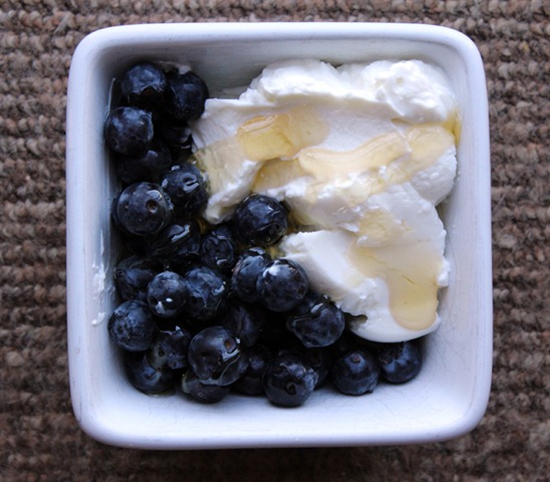Some thoughts and discussions from me.
Hello, friends!
I absolutely loved reading every single one of your comments on Tuesday’s post. It was great to hear so many of you feel the same way, or are working toward taking a more moderate approach to fitness<3
Staying on the topic of fitness for today’s post, I thought we’d talk a little about Pre-Workout Nutrition.
Every now and then when I’m training a client, I’ll notice her energy levels just aren’t what they usually are. She might be a little shaky, have a headache, or is just feeling lethargic. Guaranteed, the first question out of my mouth is, "when did you last eat?" The second question? "What did you last eat?"
It’s true that the food we eat affects our workouts and sports, but there’s so much information out there surrounding pre- and post-workout nutrition, that it can be a little confusing. From macro ratios to real food vs. protein powder to if pre-workout nutrition is even needed at all – it’s hard to get the story straight when it comes to what you should eat before you sweat.
Is a Pre-Workout Snack even Needed?
As almost all answers to questions in the fitness field, the answer is: it depends on a few things
- How many hours has it been since you last ate?
- What did you last eat?
- How long will your workout be?
- What type of workout will it be?
- At what intensity will you be performing?
- How do you feel? Are you hungry?
For the purposes of this article, let’s say that you’re working out in the morning, your last meal was at 7pm, and you’ll be completing 45 minutes of strength training with a 10 minute metabolic finisher. In this situation, pre-workout nutrition is recommended. If you were going for a short run after work, and had just eaten a sustainable meal at lunch, a pre-workout snack might not be needed.
With your pre-workout nutrition, you have a few different goals.Strength training actually creates microscopic tears in the muscle, as well as glycogen depletion or diminishment. Your pre-workout snack should be chosen to support these processes, along with provide energy sustainment for your workout.
In order to do that, protein and carbohydrate is needed, as protein aids in muscle repair and recovery, and carbohydrate delivers glucose to the muscles. The amount of these macros depends on your workout length and intensity, but for a 60 minute strength training workout, about 20 grams of protein and 30-40 grams carbohydrate is recommended.
Another factor to consider when choosing a pre-workout snack is digestibility. I love adding a small amount of collard greens to my eggs in the morning, but I probably wouldn’t add a huge amount, or a veggie that’s harder for me to digest like broccoli or Brussels sprouts.
5 Great Pre-Workout Snacks
1. Quick and Easy Microwave Breakfast Burrito: This one’s my favorite, and only takes about 3 minutes to make!
-2 eggs + 2 egg whites
-salt and pepper
-1/4 avocado, mashed
-hot sauce
-1 sprouted grain or whole wheat tortilla
Spray a small glass bowl with nonstick spray, and pour the eggs inside, and beat them with a fork. Cook in the microwave for 1 minute. Stir, cook for an additional minute, or until eggs are cooked through. Place your tortilla between two damp paper towels and microwave for 20 seconds. Spread the avocado on the tortilla, and then the eggs. Sprinkle salt, pepper, and hot sauce on top.
3. Homemade protein bars:
-No-Bake PB Cranberry Protein Bars
4. 1/2 chicken breast and 1 c. sweet potatoes
5. Pumpkin Spice Protein Shake
Now, what foods don’t typically support working out?
-anything super high in fat
-sugary or super starchy foods that will spike your blood sugar
It’s highly individual, but I most certainly do better eating lower carb in the morning and before my workout (the 30 grams mentioned above is fine.) But I also perform horribly when I have DAIRY before my workout!
Some people can handle dairy absolutely fine before a workout, but in general, dairy – especially fat free and low-fat dairy can be pretty insulinogenic, meaning that the lactose, or sugars in the milk can spike the blood sugar for those who tend to have blood sugar issues, leading to low blood sugar (and the shakes, etc.) shortly after. For years, I’d wonder why I got the shakes 20 minutes into my workout while I was downing a whey protein shake with milk just 40 minutes before my workout. Since I have past experiences of blood sugar issues.
In addition to the lactose, many people don’t digest dairy all that well, so having it right before a workout might lead to some digestion issues.






Super interesting! Thanks for sharing those pre-workout meal/snack ideas too.
I typically go with some sort of oatmeal or protein pancakes with nut butter and fruit for a pre workout meal.
Ashley @ My Food N Fitness Diaries recently posted…10/16/14: Thursday Thoughts
i cannot handle dairy before a workout either. i feel like there’s a brick in my stomach and am so sluggish. love the tips!
For me it depends on the time of day. If I workout at 5am before work, then I don’t eat. I take thyroid meds in the morning so I cannot eat within an hour of taking it. Even though I have not eaten anything since dinner the night before, I have no issue getting through my workouts. I just eat a big breakfast after. If I workout on the weekend though which is later, I usually eat scrambled egg whites before hitting the gym.
Megan @ Skinny Fitalicious recently posted…How to Break Through a Weight Loss Plateau
Yeah, it can definitely get confusing when trying to figure out if you should eat before working out. Since I typically workout first thing in the morning, I don’t eat anything before. If I go to a yoga class later in the day I can’t eat an hour or two before or else I get an upset stomach during the class.
Fiona @ Get Fit Fiona recently posted…What I Ate Wednesday and PHP for WordPress
So funny thing. The only thing I can have a little bit of Kefir yogurt mixed with my protein. But I think the probiotics help. I also like mixing just plain white rice with coconut butter. Quick Energy for sure
love these ideas! I love a banana with nut butter before I workout! However, I have usually had a big meal 1-2 hours before this.
Brittany @ Delights and Delectables recently posted…Friday Five and Favorites
Oh dairy can totally do some funky things to my tummy before a workout! I typically will have it after and I’m fine…Great tips and I love that egg burrito idea…so quick and easy!
She Rocks Fitness recently posted…dream BIG…The NEW Look of She Rocks Fitness
Great post! I’ve been trying to focus on my pre-workout nutrition, so this really helps!
Lex @ Flecksoflex recently posted…I Have Been One Lazy Lima Bean
A proper workout is best partnered with supplements to maximize the results.
EVL Nutrition creatine supplements recently posted…Special Deals
Getting fit may be hard for some, but getting that body won’t be with some help of diet supplements.
EVLution Nutrition ENGN Pre Workout recently posted…EVL Long Sleeves
These are all good recipes! However, I believe that more specialized supplements are required for those who engage in more strenuous daily workouts. Personally, I take pre-workouts, but only those that are Creatine-free.
Do not abuse workout supplements though, it must always be paired with proper diet and exercise.
Shape that body up with some supplements while you workout.
Don’t just rely on workout supplements though. You have to work out too.
EVL Nutrition ENGN pre workout supplements recently posted…BCAA ENERGY